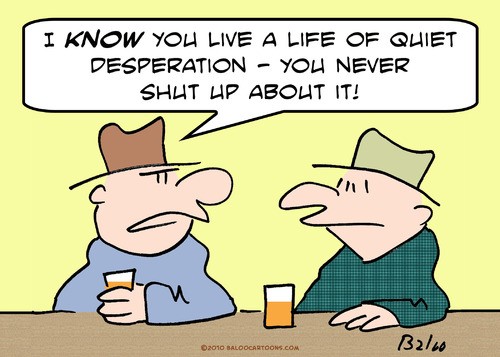Why people like to talk about themselves?
 All of us come across people who love to talk, talk and talk about themselves. We sometimes have to put up with someone who just won’t shut up, or someone who is too loud, or who has little to say but takes long time to say it, or someone who always talks about the same topic over and over again. It’s killing and frustrating for others who either try to be patient or good for the sake of it. At times, this “I”,”me”, “myself” is a boss whom you need to tolerate for obvious reasons; sometimes it can be somebody senior in age or relation. Why do they do this and what’s the best way to handle them? Such boring people simply lack social skill. They think they are enjoyable to be around with. But the fact is actually they make other hate them.
All of us come across people who love to talk, talk and talk about themselves. We sometimes have to put up with someone who just won’t shut up, or someone who is too loud, or who has little to say but takes long time to say it, or someone who always talks about the same topic over and over again. It’s killing and frustrating for others who either try to be patient or good for the sake of it. At times, this “I”,”me”, “myself” is a boss whom you need to tolerate for obvious reasons; sometimes it can be somebody senior in age or relation. Why do they do this and what’s the best way to handle them? Such boring people simply lack social skill. They think they are enjoyable to be around with. But the fact is actually they make other hate them.
Do you know people who say ‘I’, ‘me’, and ‘myself’ frequently suffer with depression and anxiety? According to a new research conducted by scientists of the University of Kassel, Germany, found that the people who use first-person singular “I’ are more likely to be depressed than those who tend to use plural pronouns, such as ‘we’ and “us”. The finding suggests that these people are unable to spend time alone and are attention-seekers. By contrast, those who use ‘we’ in conversation are healthier mentally and more social. They are good at balancing their relationships, https://www.opaortho.com/valium-treatment-anxiety/.
In the age of social media everybody is busy sharing information, photographs and details about themselves on face book and tweeter; people like to update their status, their opinions on various issues. Nobody may care about their opinion except themselves, but new brain research suggests that it can make a person feel good simply by sharing his likes and dislikes. A research suggests that it provides some sort of subjective value: It feels good. Let’s get it right, science says 30 percent to 40 percent of our speech has to do with ourselves “self-disclosure.” It is a behavior that we do all of the time, day in and day out.
So, why did evolution encourage humans to feel good when they talk about themselves? People are motivated to self-disclose for the reason of bonding with someone, with a group or a circle. Dr. Paul Zak, a brain researcher and founding director of the Center for Neuro-economics Studies at Claremont Graduate University, says that human beings are social creatures; if they did not disclose information, then others might stop interacting with them. Animals do this with smells and movements, and humans do this with speech. This study reveals how our brain evolved to motivate sociality, which is quite fascinating.
 Check yourself; are you the “I”, “me”, “myself” person? Do you always seem to find a way to make the conversation go about yourself? If yes, please understand that others feel very uncomfortable around people using the word ‘I’ more than three times per minute. Too much usage of the word ‘I’ can be an indication of either of two things: lack of empathy or excessively large longing for validation. As far as empathy is concerned, all of us in this world have a need to socialize with fellow human beings; socializing consists of exchanging of thoughts. Conversation is but obviously exchange of thoughts. Discussions are an endeavor that allows us to live together in this densely populated world. However, whenever the balance between giving and taking of thoughts becomes vague and distorted, we start feeling uncomfortable and we try to withdraw. By talking about ‘I’ too much, the conversation goes tangentially haywire. By talking about what ‘I believe this’ n ‘I believe that’ habitually, you totally take away the right of others with who you are in discussion. You disallow others from contributing to the conversation. And that is what is considered to be anti-social behavior.
Check yourself; are you the “I”, “me”, “myself” person? Do you always seem to find a way to make the conversation go about yourself? If yes, please understand that others feel very uncomfortable around people using the word ‘I’ more than three times per minute. Too much usage of the word ‘I’ can be an indication of either of two things: lack of empathy or excessively large longing for validation. As far as empathy is concerned, all of us in this world have a need to socialize with fellow human beings; socializing consists of exchanging of thoughts. Conversation is but obviously exchange of thoughts. Discussions are an endeavor that allows us to live together in this densely populated world. However, whenever the balance between giving and taking of thoughts becomes vague and distorted, we start feeling uncomfortable and we try to withdraw. By talking about ‘I’ too much, the conversation goes tangentially haywire. By talking about what ‘I believe this’ n ‘I believe that’ habitually, you totally take away the right of others with who you are in discussion. You disallow others from contributing to the conversation. And that is what is considered to be anti-social behavior.
As far as validation is concerned, if someone is using the word ‘I’ frequently it means the person has a disproportionately large need for receiving validation from social environment. This need consists of a sense of ‘wanting to be listened to.’ The question is: Why would someone keep talking about his own ideas while knowing that the listeners might not find his discussions pleasant? Well, maybe the person does not understand that his behavior is considered to be anti-social. Somebody needs to tell him to curtail the “I” in him. Or maybe the person knows the entire above but still doesn’t consider it to be anti-social; then he can only be called loathsome.
However, it is often very difficult to draw a line between what is a healthy contribution to a conversation and what is a smug or an arrogant urge to express one’s ideas. The former is admirable and can function therapeutically, constructively and even emphatically. Speaking is after all the best medium we have at our disposal to make others aware of our thoughts and beliefs. Of course creative arts such as poetry, a book, a story, a painting, a musical piece says a lot about the creator and his message. Yet, social interaction in terms of the spoken word still seems to govern human expression.
Even in the age of social media, face-to-face communication allows people to absorb the often subtle gestures, facial expressions and tonality that are required in order to express our deep thoughts. These days in over usage of electronic communication, a well-intended well written frank statement is much more likely to be misinterpreted than the same message being spoken out loud. Oral communication has advantage as the intricacies p resent in human speech can make all the difference for interpreting a message in either the intended or unintended way.
resent in human speech can make all the difference for interpreting a message in either the intended or unintended way.
All said and done, sometimes however it might be infuriating, we just have to let the ‘I-talkers’ realize that it’s time they listen to others tolerantly. Occasionally we just have to be ‘harsh’ and tell them that their conversation is going bizarre and haywire. And, we can learn something from it; even by mistake if we sometimes do the “I-talking” how boring it is for others.













































